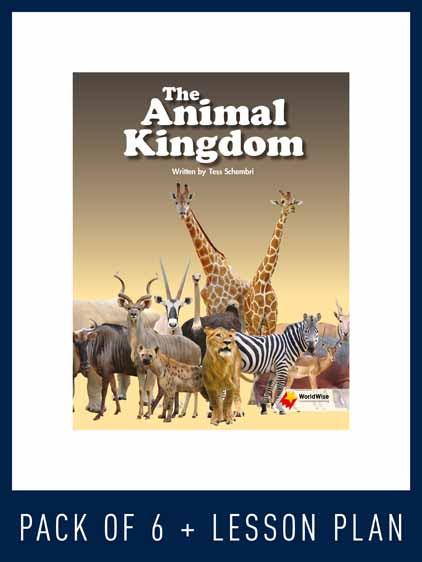Description
Condition: BRAND NEW
ISBN: 9781760867003
Year: 2020
Publisher: ECPP
Description:
This pack includes six copies of the student book (9781760861155 – as described below) and a lesson plan (9781760861698).Title Information:The Animal Kingdom: The Animal Kingdom defines the characteristics of living things and looks at the five main groups or kingdoms: animals, plants, fungi, protists (algae), and bacteria. It examines how living things have been named and classified and explores how various animals are similar and how they are different.Content vocabulary: abdomen, algae, amphibians, bacteria, cartilage, cells, characteristics, fertilise, freshwater, identify, invertebrates, larvae, mammals, offspring, paralyse, polyps, protist, reptiles, scientist, species, vertebratesKey concepts:All living things have certain characteristics All living things can be classified, grouped and given a scientific name All animals belong to the animal kingdom, which is divided into two groups: vertebrates and invertebratesReading Strategies: Interpreting tablesRelated resource: Lesson Plan - The Animal KingdomSeries Information: WorldWise is a high-interest literacy program that encourages inquiry and questioning while extending knowledge in science and a range of STEM topics linked to the curriculum. This engaging program teaches reading strategies simultaneously with natural, earth and physical science concepts – reflecting the diversity of the world students live in.Students will develop strategies and skills to read informative texts across a range of text types while they learn to become informative text writers. With an assortment of text types on offer, themes and concepts a
ISBN: 9781760867003
Year: 2020
Publisher: ECPP
Description:
This pack includes six copies of the student book (9781760861155 – as described below) and a lesson plan (9781760861698).Title Information:The Animal Kingdom: The Animal Kingdom defines the characteristics of living things and looks at the five main groups or kingdoms: animals, plants, fungi, protists (algae), and bacteria. It examines how living things have been named and classified and explores how various animals are similar and how they are different.Content vocabulary: abdomen, algae, amphibians, bacteria, cartilage, cells, characteristics, fertilise, freshwater, identify, invertebrates, larvae, mammals, offspring, paralyse, polyps, protist, reptiles, scientist, species, vertebratesKey concepts:All living things have certain characteristics All living things can be classified, grouped and given a scientific name All animals belong to the animal kingdom, which is divided into two groups: vertebrates and invertebratesReading Strategies: Interpreting tablesRelated resource: Lesson Plan - The Animal KingdomSeries Information: WorldWise is a high-interest literacy program that encourages inquiry and questioning while extending knowledge in science and a range of STEM topics linked to the curriculum. This engaging program teaches reading strategies simultaneously with natural, earth and physical science concepts – reflecting the diversity of the world students live in.Students will develop strategies and skills to read informative texts across a range of text types while they learn to become informative text writers. With an assortment of text types on offer, themes and concepts a

